- blog
- Sales Development
- Best Sales Software for Small Business 2025 | Complete Guide
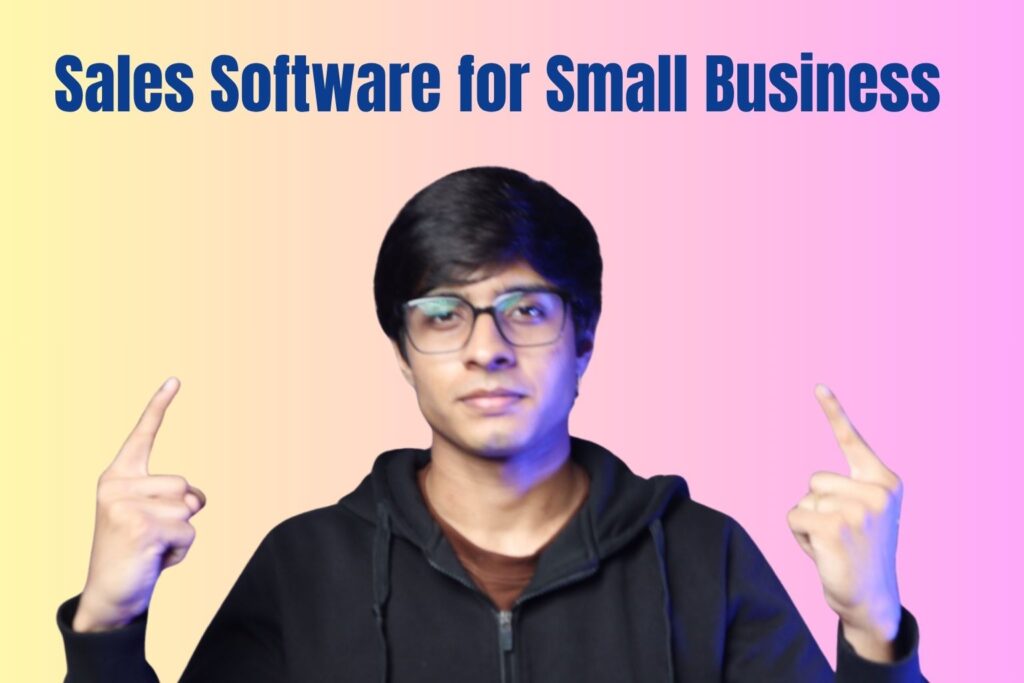
Sales Software for Small Business: Your Complete Guide to Growth in 2025
Table of Contents
What Are The Types Of Sales Software?
If you’re drowning in spreadsheets and sticky notes trying to manage your sales process, you’re not alone. 95% of sales professionals report spending less time on manual duties thanks to sales automation tools, which is why choosing the right software can be a game-changer for your business.
Sales software comes in several flavors, each designed to solve specific challenges in your sales process:
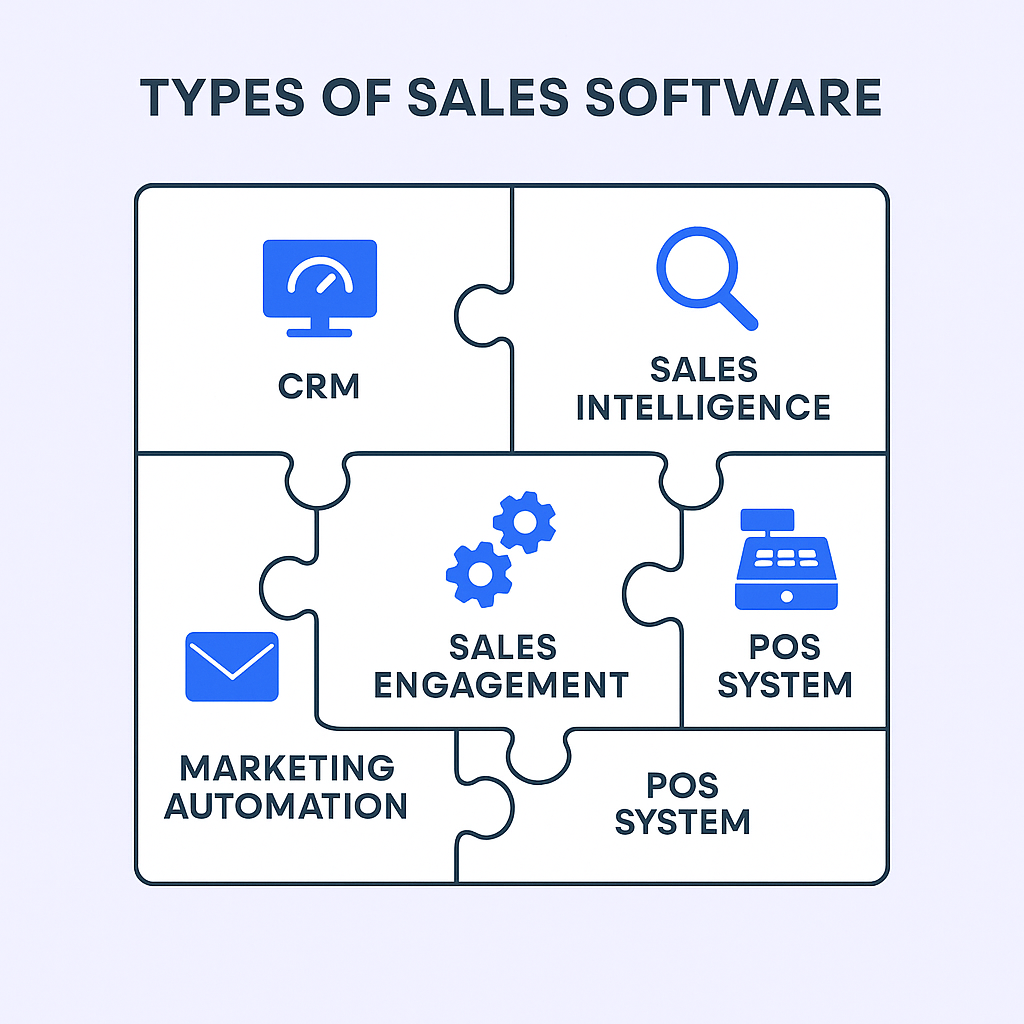
🎯 Target Decision-Makers on LinkedIn
Our outbound engine fills your CRM with qualified prospects ready to buy.
Sales Intelligence & Prospecting Tools
Finding the right prospects is half the battle. These tools help you discover new leads, verify contact information, and gather valuable insights about potential customers. Companies using sales intelligence tools report 3-15% revenue increases by focusing on better-qualified prospects.
💼 LinkedIn Outbound Beats Cold Tools
Precision targeting, personalized campaigns, and scalable systems that actually convert prospects
Sales Engagement & Automation Platforms
Time is money, especially for small businesses. These platforms automate repetitive tasks like follow-up emails, call scheduling, and data entry. Generative AI features alone can save sales reps an average of 2.5 hours per day.
Point-of-Sale (POS) Systems
For businesses with physical locations or in-person transactions, POS systems handle payment processing, inventory tracking, and basic customer management. Modern POS systems often include CRM features, making them powerful all-in-one solutions for retail businesses.
Marketing Automation Tools
While technically separate, many free marketing automation tools integrate seamlessly with sales software to nurture leads and maintain customer relationships through automated email campaigns and personalized content.
What Small Businesses Should Consider While Choosing Sales Software
The best sales automation software isn’t necessarily the most expensive or feature-rich option. It’s the one that fits your specific needs, budget, and team capabilities. Here’s your decision-making framework:
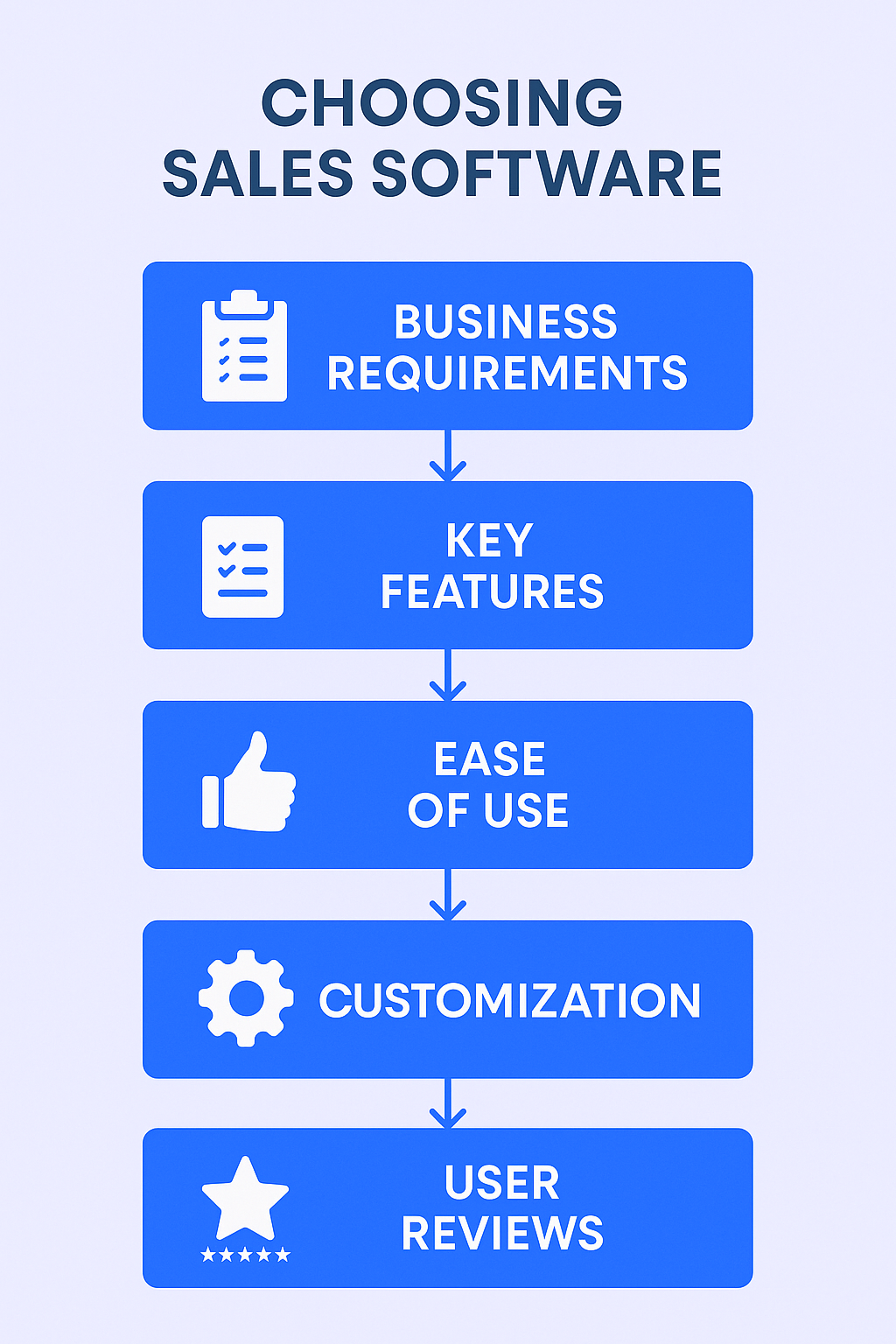
Requirements of the Business
Start by mapping your current sales process. Where do leads come from? What stages do deals move through? Where are the bottlenecks? Your biggest pain points should be the first problems your new software solves.
Consider your team size and growth plans. A solo entrepreneur needs different tools than a team of ten salespeople. The global retail enterprise software market is projected to grow from $44.59 billion in 2024 to $87.12 billion by 2030, indicating massive demand for scalable solutions.
Key Features and Functionality of the Software
Focus on must-haves versus nice-to-haves:
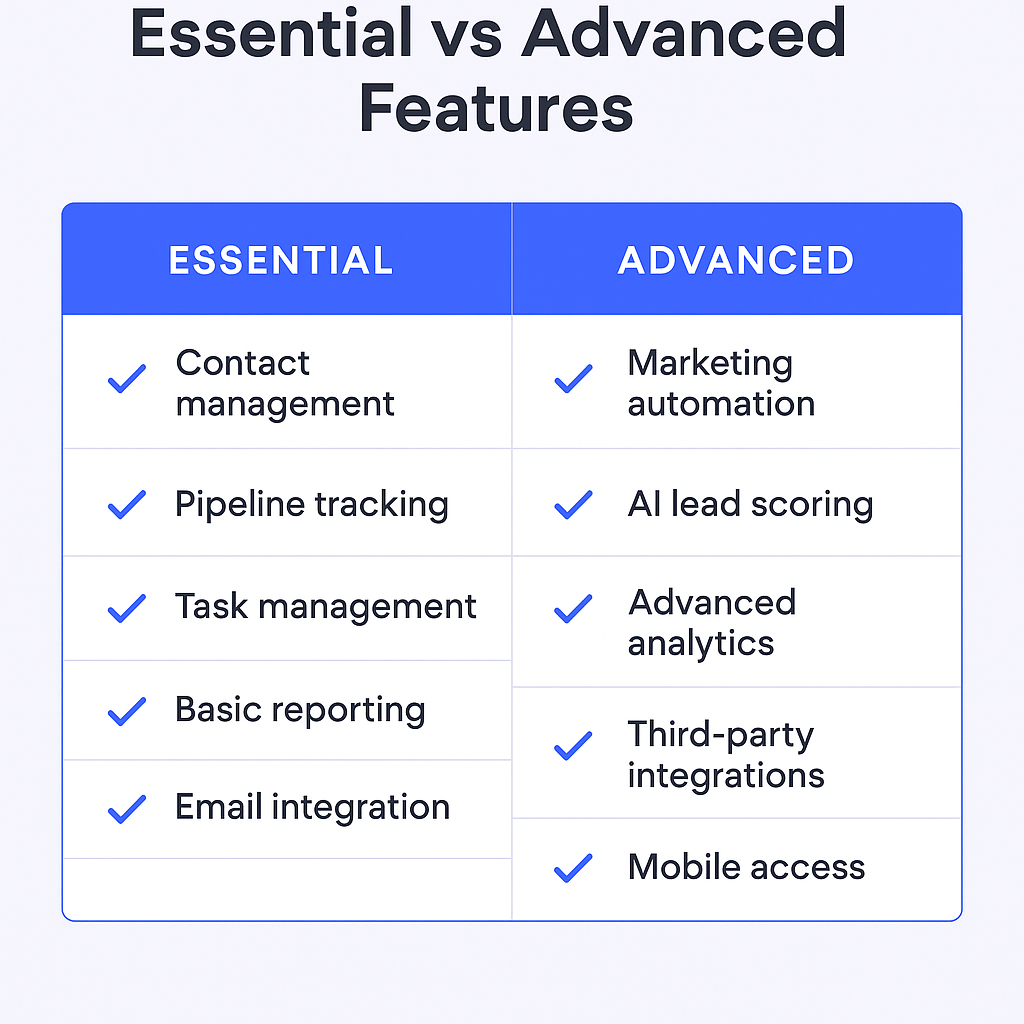
Essential Features:
- Contact management and data storage
- Visual pipeline tracking
- Task and follow-up management
- Basic reporting and analytics
- Email integration
Advanced Features:
- Marketing automation capabilities
- AI-powered lead scoring
- Advanced analytics and forecasting
- Third-party integrations
- Mobile accessibility
Ease of Use
A tool your team won’t use is worthless, regardless of its features. Look for intuitive interfaces, clear navigation, and minimal learning curves. The best software feels natural from day one, not after weeks of training.
Check for Customization Capabilities
Your sales process is unique. Can the software adapt to your specific stages, fields, and workflows? Highly customizable platforms like Zoho CRM offer enterprise-level flexibility at small business prices.
Refer To User Reviews and Testimonials
Don’t just read marketing materials. Check G2, Capterra, and Trustpilot for real user experiences. Filter reviews by company size to see feedback from businesses similar to yours. Look for patterns in complaints – recurring issues are red flags.
Best Sales Software for Small Businesses
After analyzing hundreds of options, user reviews, and pricing structures, here are the top sales software solutions that deliver real value for small businesses:
Salesso
Best for: Complete cold outreach and email automation
Salesso stands out as the best sales automation software for businesses focused on outbound prospecting. It combines email finding, verification, and automated sequences in one platform.
Key Features:
- Verified email database with 95%+ accuracy
- Automated email sequences and follow-ups
- Email warmup to improve deliverability
- Real-time analytics and performance tracking
- Chrome extension for LinkedIn prospecting
Pricing: Starts at $39/month with generous email credits Free Trial: 7-day full access trial
Phantom Buster
Best for: Social media automation and data scraping
This powerful automation tool excels at extracting data from LinkedIn, Instagram, and other social platforms. It’s particularly valuable for B2B companies building prospect lists from social networks.
Key Features:
- Social media automation
- Data extraction and lead generation
- Cloud-based operation
- Multiple platform integrations
Pricing: From $69/month Free Option: Limited free plan available
Lusha
Best for: Contact enrichment and prospecting
Lusha provides accurate contact information for prospects, making it easier to reach decision-makers. Over 1 million sales professionals use Lusha to find verified emails and phone numbers.
Key Features:
- Contact and company data enrichment
- Email and phone verification
- Salesforce and HubSpot integration
- Chrome extension for easy prospecting
Pricing: Free plan with 5 contacts/month, paid plans from $39/month
LinkedIn Sales Navigator
Best for: B2B social selling and relationship building
LinkedIn’s premium sales tool offers advanced search capabilities and relationship insights. It’s essential for businesses where LinkedIn networking drives sales.
Key Features:
- Advanced lead and company search
- InMail messaging capabilities
- Real-time sales insights
- Team collaboration tools
Pricing: $79.99/month per user Free Trial: 30-day trial available
Zapier
Best for: Connecting different sales tools
Zapier acts as the glue between your various sales automation tools, creating workflows that save hours of manual work. It connects over 5,000+ apps without coding.
Key Features:
- Automated workflows between apps
- No-code integration platform
- Trigger-based actions
- Multi-step automations
Pricing: Free plan for basic automations, paid plans from $19.99/month
HubSpot
Best for: All-in-one CRM and inbound marketing
HubSpot’s free CRM is legendary, offering unlimited contacts and users with no expiration date. It’s the perfect starting point for businesses new to sales software.
Key Features:
- Free CRM with unlimited contacts
- Marketing, sales, and service hubs
- Powerful automation capabilities
- Extensive integration marketplace
Pricing: Free forever plan, paid plans from $45/month Best For: Businesses wanting comprehensive growth platforms
Zendesk
Best for: Customer service integration with sales
Originally a support platform, Zendesk Sell provides excellent CRM capabilities with seamless customer service integration. Perfect for businesses prioritizing post-sale relationships.
Key Features:
- Sales pipeline management
- Customer service integration
- Advanced analytics and reporting
- Mobile-first design
Pricing: From $25/month per user
Pipedrive
Best for: Visual pipeline management
Built by salespeople for salespeople, Pipedrive excels at visual deal tracking. Its drag-and-drop interface makes pipeline management intuitive for any team.
Key Features:
- Visual sales pipeline
- Activity-based selling approach
- Sales automation and AI assistant
- Excellent mobile app
Pricing: From $14.90/month per user Free Trial: 14-day trial
BIGContacts
Best for: Simple contact management
One of the most affordable options, BIGContacts focuses on core contact management and email marketing. Ideal for small teams needing basic CRM functionality.
Key Features:
- Contact database management
- Email marketing integration
- Sales pipeline tracking
- Web form integration
Pricing: From $5/month per user Free Plan: Available for small teams
Apollo
Best for: Comprehensive B2B database
Apollo combines a massive B2B contact database with sales engagement tools. It’s a one-stop solution for finding prospects and managing outreach.
Key Features:
- 250+ million contact database
- Email and phone number verification
- Sales engagement sequences
- Advanced search and filtering
Pricing: Free plan with limited credits, paid plans from $49/month
EngageBay
Best for: Budget-friendly all-in-one solution
EngageBay offers HubSpot-like functionality at a fraction of the cost. It’s perfect for startups needing comprehensive features without the premium price tag.
Key Features:
- Marketing, sales, and service tools
- Email marketing automation
- Landing page builder
- Live chat and helpdesk
Pricing: Free plan available, paid plans from $11.99/month
Magical
Best for: Data entry automation
Magical eliminates manual data entry by automatically transferring information between applications. It can save hours of administrative work daily.
Key Features:
- Automated data transfer
- Works with any web application
- No IT setup required
- Personal productivity focus
Pricing: Free plan available, paid plans from $20/month
Reply.io
Best for: Email sequence automation
Reply.io specializes in multi-channel sales sequences, combining email, LinkedIn, and phone outreach. It’s ideal for systematic, scalable outreach campaigns.
Key Features:
- Multi-channel sequences
- Email deliverability optimization
- A/B testing capabilities
- Team collaboration tools
Pricing: From $60/month per user
ActiveCampaign
Best for: Advanced marketing automation
While primarily a marketing platform, ActiveCampaign’s sales CRM features make it excellent for businesses prioritizing free marketing automation tools integration.
Key Features:
- Advanced email automation
- Behavioral tracking
- Sales CRM integration
- Machine learning optimization
Pricing: From $29/month Free Trial: 14-day trial available
Calendly
Best for: Meeting scheduling automation
Calendly eliminates the back-and-forth of scheduling meetings. It integrates with most CRMs to automatically log scheduled appointments.
🚀 Build Complete Outbound Systems
We design, launch, and scale LinkedIn campaigns that book meetings automatically.
Key Features:
- Automated meeting scheduling
- Calendar integration
- Meeting reminders and follow-ups
- Team scheduling features
Pricing: Free plan available, paid plans from $8/month per user
⚡ Ready for Predictable Pipeline Growth?
Our LinkedIn outbound engine delivers qualified leads while you focus on closing.
7-day Free Trial |No Credit Card Needed.
Final Words
Choosing the right sales software isn’t about finding the most features or the lowest price – it’s about finding the perfect match for your specific business needs. Companies that leverage modern sales tools report revenue increases between 3% and 15%, making this decision crucial for your growth trajectory.
Start with your biggest pain points. Are you losing leads due to poor follow-up? Choose automation-focused tools like Salesso or Reply.io. Need better organization? Start with a solid CRM like HubSpot or Pipedrive. Want to find more prospects? Invest in prospecting tools like Apollo or Lusha.
Remember, what are sales tools if not investments in your business’s future? The right software doesn’t just organize your current process – it scales your ability to grow, compete, and succeed in an increasingly competitive marketplace.
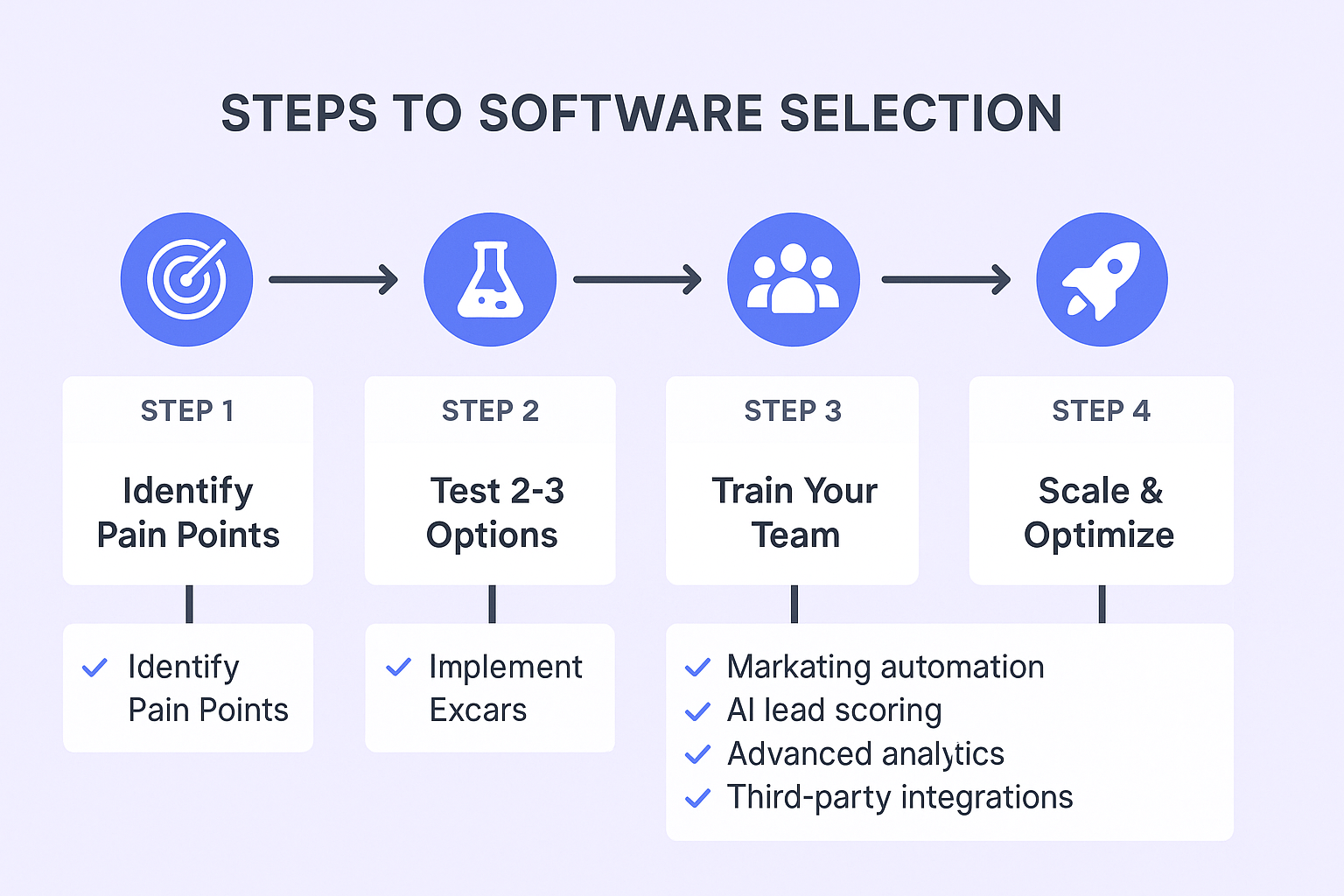
The key is starting somewhere. Most platforms offer free trials or plans, so you can test-drive multiple options before committing. Your perfect sales software stack is out there – the only mistake is not taking action to find it.
FAQs
How To Choose The Best Sales Software For Small Businesses?
What Is The Need For Sales Software?
Can Sales Software Be Customized To Suit The Needs Of A Small Business?
How Can Sales Software Enhance Customer Outreach?
What Are The Challenges Faced By Small Businesses Implementing Sales Software?

Scale Your Sales with LinkedIn Outbound
Stop chasing tools. Start closing deals with our complete LinkedIn lead generation engine.

